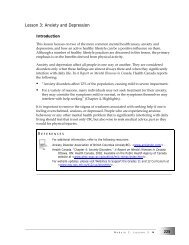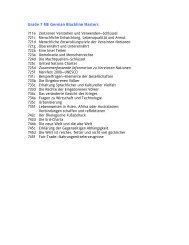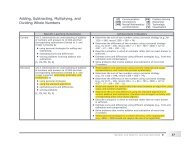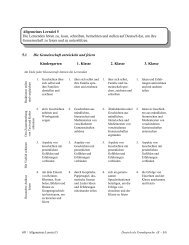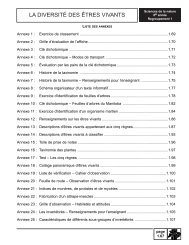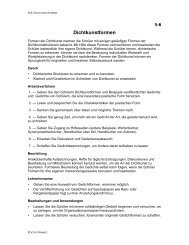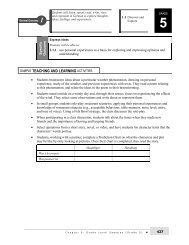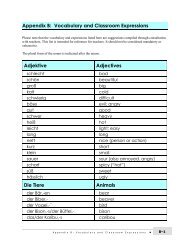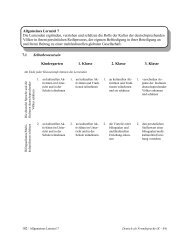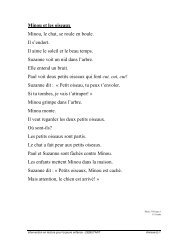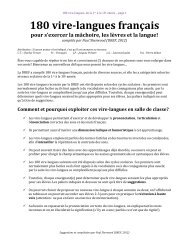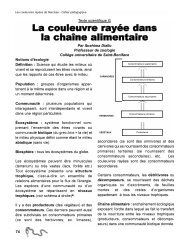Français de base de la 4e à la 8e année, chantons, bougeons ...
Français de base de la 4e à la 8e année, chantons, bougeons ...
Français de base de la 4e à la 8e année, chantons, bougeons ...
You also want an ePaper? Increase the reach of your titles
YUMPU automatically turns print PDFs into web optimized ePapers that Google loves.
Chansons folkloriques Partons, <strong>la</strong> mer est belle<br />
Partons, <strong>la</strong> mer est belle – piste 10 / track 10<br />
1. Amis, partons sans bruit;<br />
La pêche sera bonne,<br />
La lune qui rayonne<br />
Éc<strong>la</strong>irera <strong>la</strong> nuit.<br />
Il faut qu’avant l’aurore<br />
Nous soyons <strong>de</strong> retour,<br />
Pour sommeiller encore<br />
Avant qu’il soit grand jour.<br />
Refrain:<br />
Partons, <strong>la</strong> mer est belle;<br />
Embarquons-nous, pêcheurs.<br />
Guidons notre nacelle,<br />
Ramons avec ar<strong>de</strong>ur.<br />
Aux mâts hissons les voiles,<br />
Le ciel est pur et beau;<br />
Je vois briller l’étoile<br />
Qui gui<strong>de</strong> les matelots!<br />
Origines <strong>de</strong> <strong>la</strong> chanson<br />
La chanson Partons, <strong>la</strong> mer est belle, qui<br />
remonte aux <strong>année</strong>s 1800, est considérée<br />
comme une chanson acadienne même si <strong>la</strong><br />
première version connue fut imprimée en France<br />
en 1910. La première publication en sol<br />
canadien date <strong>de</strong> 1920 et cette version montre<br />
que les paroles ont été modifiées pour l’adapter<br />
au contexte acadien.<br />
La chanson décrit combien le travail <strong>de</strong> <strong>la</strong> pêche<br />
était difficile et menait souvent <strong>à</strong> une tragédie.<br />
Pour avoir plus <strong>de</strong> détails, visitez le site Web :<br />
http://www.mountaindulcimer-1-3-<br />
5.com/Working_Files/Let%27s_Sail_Out_text.pdf<br />
(page consultée le 28 juin 2009)<br />
2. Ainsi chantait mon père<br />
Lorsqu’il quitta le port.<br />
Il ne s’attendait guère<br />
À y trouver <strong>la</strong> mort.<br />
Par les vents, par l’orage<br />
Il fut surpris soudain;<br />
Et d’un cruel naufrage<br />
Il subit le <strong>de</strong>stin.<br />
Refrain<br />
3. Je n’ai plus que ma mère<br />
Qui ne possè<strong>de</strong> rien;<br />
Elle est dans <strong>la</strong> misère,<br />
Je suis son seul soutien.<br />
Ramons, ramons bien vite,<br />
Je l’aperçois l<strong>à</strong>-bas.<br />
Je <strong>la</strong> vois qui m’invite<br />
En me tendant les bras.<br />
Refrain<br />
Song Origins<br />
Partons, <strong>la</strong> mer est belle, thought to date back to<br />
the 1800s, is consi<strong>de</strong>red to be an Acadian song<br />
even though the first known printed copy was<br />
published in 1910 in France. Its first Canadian<br />
publication was in 1920 and this version<br />
indicates that the song un<strong>de</strong>rwent lyrical<br />
changes to suit the Acadian setting.<br />
The song <strong>de</strong>scribes how the common livelihood<br />
of fishing was so difficult and often en<strong>de</strong>d in<br />
tragedy. For more <strong>de</strong>tails, visit the Website<br />
below.<br />
http://www.mountaindulcimer-1-3-<br />
5.com/Working_Files/Let%27s_Sail_Out_text.pdf<br />
(June 28, 2009)<br />
<strong>Français</strong> <strong>de</strong> <strong>base</strong>, 4 e <strong>à</strong> <strong>la</strong> 8 e <strong>année</strong>, Chantons, <strong>bougeons</strong>, amusons-nous! 83




